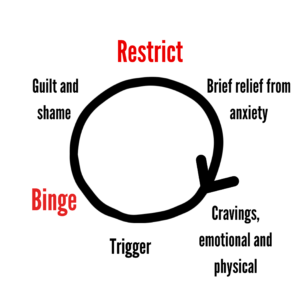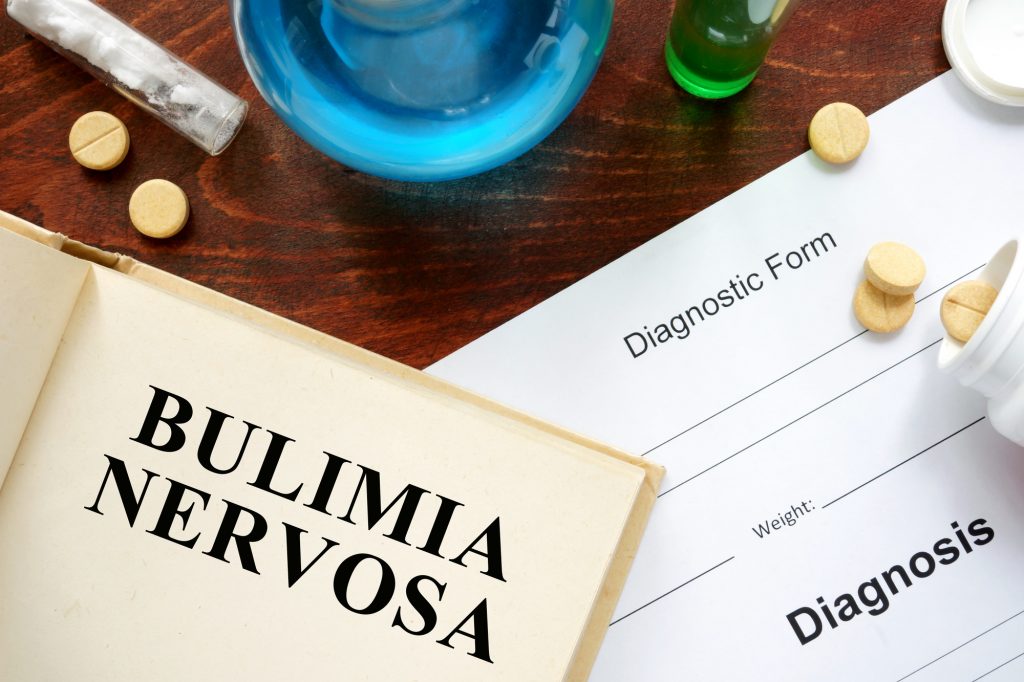Bulimia nervosa is an eating disorder characterized by frequent episodes of overeating followed by behaviors aimed at undoing the effects of overeating, including purging.”
Contents
- 1 What Is Bulimia Nervosa?
- 2 Signs Of Bulimia Nervosa
- 3 Causes Of bulimia nervosa
- 4 Risk Factors Of Bulimia Nervosa
- 5 Effects Of Bulimia Nervosa
- 6 Who Can Get Bulimia Nervosa?
- 7 Step To Recover From Bulimia Nervosa
- 8 Breaking Binge And Purge Cycle
- 9 How To Help Someone Who Has Bulimia?
- 10 Treatment For Bulimia Nervosa
- 11 Conclusion
What Is Bulimia Nervosa?

Bulimia nervosa is a serious mental disorder that can be hard to identify. It manifests in people of all shapes and sizes, so the only person capable of recognizing it is often the person who has it. The key to identifying bulimia nervosa is being observant of warning signs such as weight fluctuations, changes in eating patterns (such as binging or skipping meals), excessive exercise, feeling out of control when making food choices, and constantly thinking about food.
Bulimia nervosa can be a very isolating disorder, as those who suffer from it often feel ashamed and embarrassed. This can make it difficult to seek help, but it is important to do so if you think you or someone you know might have bulimia nervosa. Treatment for bulimia nervosa typically involves therapy, medication, and lifestyle changes. With the right treatment plan in place, bulimia nervosa can be dealt with effectively. If left untreated, however, it is very possible for a person with bulimia nervosa to develop serious complications such as electrolyte imbalances or ruptured esophageal veins that can cause more severe medical issues.
Bulimia Nervosa is a serious disorder that may be difficult to identify. It can manifest itself in a variety of ways, including changes in eating habits and excessive exercise.
Signs Of Bulimia Nervosa
The warning signs of bulimia nervosa are changes in eating patterns, excessive exercise, feeling out-of-control when making food choices, and obsessively thinking about food.
Warning signs of bulimia nervosa are changes in eating patterns, excessive exercise, feeling out-of-control when making food choices, and obsessively thinking about food.
Other symptoms are-

- Lack of control over eating habits
- Purging after eating through voluntary vomiting, abusing laxatives or diuretics, fasting, excessive exercise, or using enemas
- Changes in weight
- Swollen glands in the neck and face
- Bad breath
- Damaged teeth and gums from frequent vomiting
- Calluses on the knuckles from self-induced vomiting
- Changes in mood
- Depression
- Anxiety
- Hypersensitivity to comments about body shape or weight
- Increased risk of suicide
Causes Of bulimia nervosa
Causes of bulimia nervosa can be a variety of reasons. These causes can range from stress to the result of past trauma, to a sense of being disconnected from oneself.
Bulimia nervosa can attribute to a number of causes. It is not uncommon for people suffering from this disorder to have experienced some form of abuse, neglect, or trauma during their childhood. Some people with bulimia nervosa may also suffer from an addiction to drugs, alcohol, or gambling. Other instances might be caused by feelings surrounding body image or depression and anxiety due to low self-esteem or poor self-image.
Risk Factors Of Bulimia Nervosa
There are many risk factors that are associated with bulimia nervosa. Bulimia nervosa usually develops at a time when the person may be feeling out of control. Risk factors for bulimia nervosa could include psychological disorders, genetics, or past histories of abuse or neglect. There is also a strong link between self-esteem and bulimia nervosa.
- Poor body image
- Low self-esteem
- A distorted view of one’s body may be linked to bulimia nervosa.
In addition, people with bulimia nervosa may have been exposed to eating disorders during their childhood.
Effects Of Bulimia Nervosa

The effects of bulimia nervosa can be physically, mentally, and emotionally taxing both on the person suffering from the disorder as well as those around them.
Common physical effects are dental problems, dry skin, hair loss, joint pain, low blood pressure, or an irregular heart rate.
Mental health effects are depression or feeling crazy. Emotional effects are feeling out of control or that they’re the only person struggling.
People with bulimia nervosa often feel a lot of shame and guilt. They may feel like they are failures because they cannot stick to their own rules or stop binging and purging. This can lead to more isolation and secrecy, making it even harder to get help. Getting help for bulimia nervosa is critical, as the effects can be debilitating and life-threatening. Treatment may include therapy, medication, and lifestyle changes. Recovery is possible and often leads to a better quality of life.
If you or someone you know is suffering from bulimia nervosa, please seek help. There is no shame in getting help for your mental health. Treatment can save a life.
Who Can Get Bulimia Nervosa?
Bulimia nervosa is a common disorder, with 1 in every one thousand people suffering from it. Since bulimia nervosa can be difficult to identify, the number of people actually living with the disorder may be much higher. Bulimia nervosa can affect anyone, regardless of sex, age, or weight.
People with bulimia nervosa feel trapped in their disorder. It is important for friends and family to be supportive throughout the treatment process because having people who are willing to listen helps people with bulimia nervosa work through difficult feelings.
Step To Recover From Bulimia Nervosa

A big step to recover from this disease is to find a support network. Whether it’s friends, family members, or a mental health professional, having someone that you can confide in about your struggles and successes will make all the difference. It can be a life-threatening disorder with physical and emotional consequences, but it doesn’t have to control your life forever with proper treatment and a support network. Recovery may be long, but it’s worth it.
Realize you have a problem
If you have a desire to eat everything in sight and then rid your body of the food through vomiting, laxatives, or excessive exercise, you may have bulimia nervosa.
Contact your medical doctor
Your doctor will help diagnose if you in fact do have bulimia nervosa and what treatment is best for you. He or she can also screen for any physical complications with this disorder.
Find a therapist
Find a therapist or mental health professional who specializes in eating disorders like bulimia nervosa. A therapist can help teach healthier coping mechanisms to control your urges to binge and purge.
Avoid things that stimulate binging
Avoid people, locations, and activities that stimulate binge or purge behavior. This can be a difficult task, but it’s important in order to prevent relapse.
Join a support group
This is an excellent way to find people who understand what you’re going through and can offer encouragement and advice.
Be patient with yourself
Recovery from bulimia nervosa is not easy and there will be bumps in the road. Take things one day at a time and celebrate your accomplishments, no matter how small they may seem.
Address any underlying mood disorder
Many people with bulimia nervosa also suffer from depression, anxiety, or bipolar disorder. Getting treatment for these disorders can help improve your chances for recovery from bulimia nervosa.
Seek medical attention
Seek medical attention if you are experiencing any physical symptoms like dehydration, low blood pressure, irregular heart rate, or electrolyte imbalance. These can be signs of serious health complications and need to be addressed immediately.
Educate yourself about bulimia nervosa
The more you know about the disorder, the better equipped you’ll be to deal with it. There is a lot of information available online and through support groups. Also stay positive as recovery is possible and you can lead a happy, healthy life free from bulimia nervosa.
Breaking Binge And Purge Cycle
 One of the first steps to breaking the binge and purge cycle is determining why you are purging. Once you have an idea, try changing your behaviors to see if you can identify a pattern in them. Keep a food diary and see if anything stands out as a trigger for your episodes.
One of the first steps to breaking the binge and purge cycle is determining why you are purging. Once you have an idea, try changing your behaviors to see if you can identify a pattern in them. Keep a food diary and see if anything stands out as a trigger for your episodes.
If you’re having a hard time figuring out a trigger for your binges or purges, talk with someone supportive about what might be triggering the behaviors. Ask family members or friends who care about you for support. They may be able to help you figure it out.
You can also seek support from a therapist or counselor. To find a therapy that works for you, visit the Psych Central Therapy Directory. You’ll find a list of therapists and counselors in your area who specialize in bulimia nervosa treatment.
When it comes to breaking the binge and purge cycle, you will have to change some behaviors before other ones. Identify the behaviors that are making you feel worse about yourself and work on changing those first. Then move on to the next behavior.
Remember that you don’t have to break the binge and purge cycle on your own. If you’re having problems with self-control or feel like giving up, get support from someone who cares about you.
How To Help Someone Who Has Bulimia?

If you have a friend or loved one who is struggling with bulimia nervosa, there are ways you can help.
- First, be supportive and understanding. It may be difficult for the person to admit they have a problem and even more difficult to seek help. Let them know you’re there for them, no matter what.
- Second, encourage them to seek professional help. There are treatments for bulimia that have been carefully tested by researchers for safety and effectiveness. Don’t be afraid to try something new if it seems like it might help.
- Third, be there for them when they need you. Offer practical help, such as cooking meals or running errands, or just listen when they need to talk.
- Fourth, avoid judging them or making them feel guilty. Bulimia is a complex disorder that is not caused by character flaws or bad decisions. It’s important to remember that the person is not trying to hurt you on purpose.
- Last, be patient. Recovery from bulimia nervosa is a long process, and there will be ups and downs. Be there for your friend or loved one throughout the entire journey.
Treatment For Bulimia Nervosa
Treatment for bulimia nervosa typically involves therapy, medication, and lifestyle changes. With the right treatment plan in place, bulimia nervosa can be dealt with effectively. If left untreated however it is very possible for a person with bulimia nervosa to develop serious complications such as electrolyte imbalances or ruptured esophageal veins that can lead to more serious medical issues.
Therapy For Bulimia Nervosa

Therapy is often recommended for people with bulimia nervosa as it can help identify triggers and unhealthy behaviors related to the condition. There are many different types of therapy available, so it’s important to find one that works for you. Some of the common therapies include cognitive-behavioral therapy (CBT), interpersonal therapy, and family-based treatment.
Cognitive-behavioral therapy– cognitive-behavioral therapy (CBT) is a type of therapy that helps you change the thoughts and behaviors that contribute to your bulimia nervosa.
Interpersonal therapy– interpersonal therapy (IPT) is a type of therapy that helps you identify and address problems in your relationships that may be contributing to your disorder.
Family-based treatment– family-based treatment (FBT) is a type of therapy that helps you work with your family to address the problems.
Treatments for bulimia nervosa have been carefully tested by researchers for safety and effectiveness, so don’t worry about trying an unfamiliar approach if another idea sounds good to you. As long as a treatment is recommended by a reputable source, there is no harm in trying it.
Conclusion
Bulimia nervosa is a disorder that affects both men and women. Bulimics may binge eat, then purge the food by vomiting or using laxatives to prevent weight gain. If you think that you might be bulimic, it’s important not to ignore your symptoms in order to get better. Because seeking help could save your life. Also, remember that you are not alone with this issues-help is available for you.
If you are looking for affordable Online Counseling MantraCare can help: Book a trial therapy session


